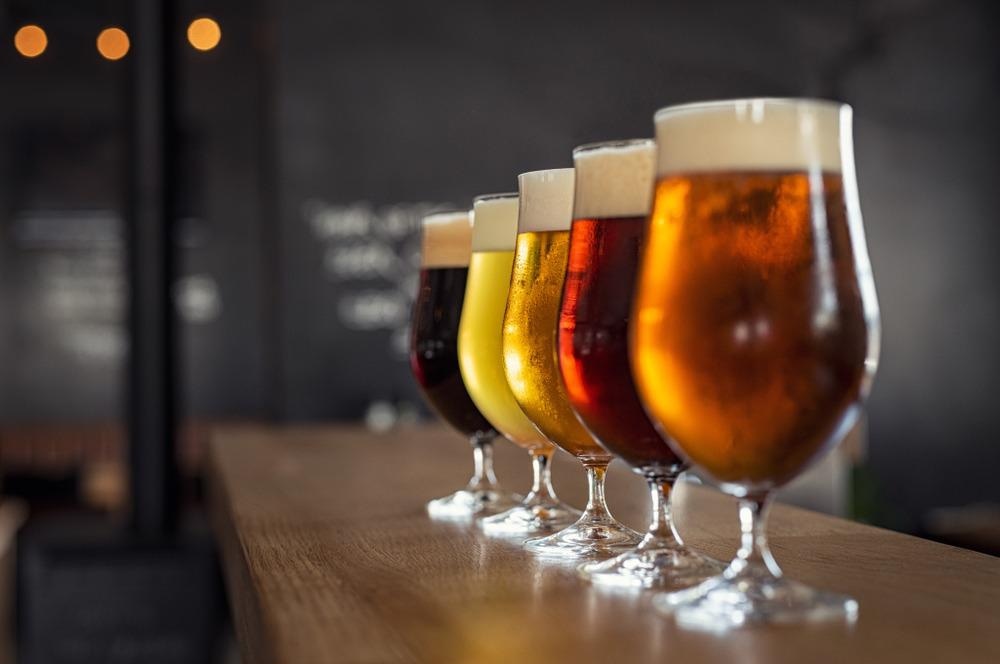Like all industries, the beer industry is adapting to changing times and taking advantage of innovative technologies to meet the demands of modern society. This article will provide an overview of how sensors are used in the industry and briefly explore companies leading the way in this technological revolution.

Image Credit: Rido/Shutterstock.com
The Modern Brewing Industry
Brewing is a key economic activity in many countries. In 2020, the market size of the global beer industry was ~$605 billion, with this figure predicted to rise to over $800 billion by 2030. Rapid population growth, urbanization, and individuals’ improving finances have led to the demand for high-quality products. Consequently, consumer preferences have shifted, especially amongst younger, aspirational drinkers in developed economies, for different beers than traditional market sectors have demanded.
Several global players have emerged in recent decades in the beer industry, including China, India, the Czech Republic, and the Caribbean nations. These markets have challenged the traditional market players, and there has been an exponential growth in upcoming breweries offering new types of beer and other alcoholic beverages.
The modern brewing industry must meet stringent health and safety, hygiene, and quality standards. Government regulations have been enacted over the years to tightly control the alcohol content, quality, and type of beer that can be sold and distributed in international markets.
To meet the stringent demands of the modern alcoholic beverage market, companies are increasingly turning to innovative technologies. AI, the Internet of Things (IoT), automated systems, robotics, and sensors are becoming essential for the modern brewing industry.
What are Sensors Used for in the Beer Industry?
Process sensors enable increased automation in the beer production process, improving the efficiency of the process, quality control, and the quality of the final product. Transmitters, sensors, and measuring equipment work together to extract, collate, and analyze critical process data and provide constant, 24-hour a day monitoring of the various stages of the manufacturing process.
Utilizing sensors allows manufacturers to assess several process parameters. Pressure, fill level, temperature, flow, and conductivity of media can all be monitored in real-time. Precise analysis and differentiation of fluid media can be achieved, and fast temperature compensation and response times improve efficiency and reduce spoilage and waste.
Pressure sensors, switches, and transmitters enable precise measurement of pressure in equipment, which is critical for safety issues during manufacturing. These sensors monitor relative pressure, absolute pressure, and vacuum in pressurized containers and equipment.
Temperature sensors are used to monitor the temperature of the mash during the brewing process but are also used to monitor the temperature of cleaning agents, regulating the process. The return temperature of the cleaning agent is constantly monitored to determine when the desired set point has been achieved for timer initiation. RTDs and thermocouples are typically used and, while accurate, are invasive, requiring direct contact with the cleaning agent.
Waste is another key issue in the brewing industry. The presence of excess oxygen, for example, ruins beer quality and leads to shortened shelf lives. Foaming causes excess dissolved oxygen in the product.
Fill levels may not be consistent, and the presence of bacteria due to insufficient quality control can lead to thousands of dollars per month being lost by brewers. Accurate and reliable sensors can address these quality, health and safety, and economic challenges.
Some of the Companies and Sensors on the Market
There are several sensors available on the market currently which can be utilized for a multitude of applications in the manufacturing process. Mettler Toledo, for instance, markets a range of DO sensors for the brewing industry. These sensors help manufacturers monitor and manage dissolved oxygen.
DO sensors offer outstanding performance and reliable measurements, ensuring that final products meet the required quality and taste standards. They take advantage of intelligent sensor management technology to improve predictive diagnostics and simpler calibration. Sensors utilize optical fluorescence quenching and polarographic/amperometric measurement technologies.
Aside from production, the hospitality sector plays a key role in the beer industry. Titan has also supplied 600,000 flow sensors for the beer industry over the past two decades. One solution this company has produced to resolve flow sensor lifespan problems and improve on unreliable optical detection methods is an adapted version of their 800-series turbine flow meter. This sensor solution improves the maintenance of beer cellars.
Other examples of sensors on the market include Baumer UK’s CombiLyz sensor range, which measures conductivity. These sensors are durable and satisfy food safety regulations. Bar Analytics market a range of easy-to-use internet-connected beer quality and volume sensors.
In the US, Sugar Creek Brewing have collaborated with IBM to provide next-generation, innovative solutions for their brewing operations. Intriguingly, they are aiming to develop the first AI-designed beer.
The Future
The beer and brewing industries are rapidly modernizing to meet the evolving demands of the market and consumers. The increasing utilization of sensors in the beer industry, and integration with innovative solutions such as IoT and AI, are driving a technological revolution in the industry, offering significant improvements in quality, health and safety, waste reduction, and economic opportunities.
Continue reading: Carbon Dioxide Monitoring in the Food and Beverage Industry
References and Further Reading
Bandoim, L (2019) Brewery Uses AI And IoT Technology to Improve the Quality of Beer [online] Forbes.com. Available at: https://www.forbes.com/sites/lanabandoim/2019/07/24/brewery-uses-ai-and-iot-technology-to-improve-the-quality-of-beer/?sh=7896e86b4a98
Mettler Toledo (2022) DO Sensors for Breweries [online] mt.com. Available at: https://www.mt.com/gb/en/home/products/Process-Analytics/sensors-for-brewing/DO-sensors-for-breweries.html?filter[primary-media%2Fapplication]=Food%20and%20Beverage
Flow Meters (2017) Beer Flow Sensors: Titan Supply 600,000 Flow Sensors to the Beer Industry [online] flowmeters.co.uk. Available at: https://flowmeters.co.uk/
Omega (2021) HANI Application: Temperature Monitoring for CIP Processes in Beer Brewing Systems [online] omega.com. Available at: https://www.omega.com/en-us/resources/hani-temperature-monitoring-cip-beer-brewing
Bar Analytics (Homepage) baranalytics.co.uk. Available at: https://www.baranalytics.co.uk
Disclaimer: The views expressed here are those of the author expressed in their private capacity and do not necessarily represent the views of AZoM.com Limited T/A AZoNetwork the owner and operator of this website. This disclaimer forms part of the Terms and conditions of use of this website.